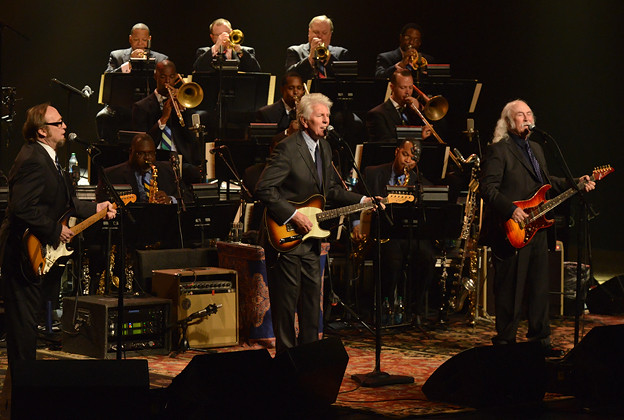Rolling Stone: Crosby, Stills and Nash Work Out With Jazz at Lincoln Center Orchestra

photo: Frank Stewart
On January 27th, 1970, Miles Davis recorded a version of the medieval whisper “Guinevere” from Crosby, Stills and Nash’s 1969 debut album, Crosby, Stills & Nash. Davis’ take was in the manner of his recently-cut, not-yet-released album, Bitches Brew – 18 minutes of electric turmoil with a buzzing current of sitar and only passing references to David Crosby’s original melody. It was a rare instance of Davis losing his way in an astutely chosen song. His “Guinevere” stayed in the can until 1979, when it appeared on the anthology Circle in the Round.
On May 3rd at the Rose Theater in New York, Crosby and Graham Nash performed the song with another trumpeter, Wynton Marsalis, near the end of Crosby, Stills and Nash’s concert with the Jazz at Lincoln Center Orchestra. Stephen Stills left the stage to his bandmates for this number; the rest of the Orchestra stayed quiet while Marsalis sat on a stool between the two singers – a fitting position, as the song opened with his horn acting as a third voice, playing the melody in a soft unison and low, hearty register inside Crosby and Nash’s moving harmonies. When Marsalis did step away from the script, his flourishes and solo were elegant and precise, like the singing.
A Third Way
CSN’s appearance with the JALC band – the second of two shows that week, titled the Crosby, Stills and Nash Songbook – was the least obvious and potentially most problematic of the latter’s recent collaborations with veteran rock acts. Where guitarist Eric Clapton came to JALC as a star soloist, mostly improvising on classic jazz and blues tunes, and Paul Simon arrived with a songbook full of new-arrangement possibilities, Crosby, Stills and Nash’s primary, original repertoire – the foundation of their concerts for more than 40 years – is tied to their voices and the words and melodies written for them.
Q&A: Stephen Stills on Huge New Box Set
The difficulty in finding room to move and invent for an instrumental ship as big as the JALC Orchestra was evident in the first number, Nash’s “Military Madness,” which was refitted with an uptempo rhythm and sunny bursts of brass that sounded appealing but contradicted the original recording’s stately sobriety. When the show succeeded – which was the rest of the night – CSN and JALC bonded in a manner that wasn’t fusion, as we’ve come to know it in jazz and rock, but a third way made natural by the jazz inflections Crosby has favored in songs such as “Déja Vu” and the Latin accents in Stills’ writing, including the hit “Love the One You’re With.”
The JALC band responded with smart, complimentary touches: the way the horns echoed the glide and breath of the voices in saxophonist Victor Goines’s scoring of “Helplessly Hoping”; Sherman Irby’s breezy, alto-sax break in “Marrakesh Express.” (Crosby enjoyed himself so thoroughly during the latter that he started playing along – on air upright bass.) The Orchestra treated the eccentric delicacy of “Suite: Judy Blue Eyes” with wise restraint: chiming in with warm bluster for the finale but leaving long spells to the core trio. Marsalis, sitting in the top row of the brass section, could be seen smiling and shaking his head in admiration at the cutting tone and flamenco-like attack in Stills’ acoustic-guitar solo.
Perfect Harmony
CSN, in turn, left “Critical Mass” – the pure vocal introduction to “Wind on the Water,” from Crosby and Nash’s 1975 duo album of that name – entirely to the horns. It was an obvious but beautiful move, with the trumpets, trombones and reeds rising and falling in a rich, moving curtain of deep sigh and hearty exclamation. At one point in the show, Crosby likened the meeting of CSN and JALC as “three children being let loose at NASA.” But the former brought a singular vocal humanity to the evening that was big and warm enough, in its harmonic range and composing ambition, for the JALC band to show its own imagination and prowess.
“I said if they let us do this again, we’d bring some complex shit,” Crosby cracked after that sweet, earthy “Helplessly Hoping.” “Because they can play anything.” CSN were just as happy to sing along to whatever the orchestra threw back at them. There was no planned encore – the show ended with “Teach Your Children.” But after a 10-minute ovation, with the house lights up, CSN returned with Marsalis and some JALC players for a New Orleans brass-band romp through “Li’l Liza Jane,” with Crosby waving a towel over his head like a second-liner – another kind of déja vu.
by David Fricke
Source: Rolling Stone
